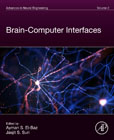
Advances in Neural Engineering Volume 2: Brain-Computer Interfaces
S. El-Baz, Ayman
Suri, Jasjit
Neural engineering is an emerging and fast-moving interdisciplinary research area that combines engineering with (a) electronic and photonic technologies, (b) computer science, (c) physics, (d) chemistry, (e) mathematics, and (f) cellular, molecular, cognitive, and behavioral neuroscience. This helps us understand the organizational principles and underlying mechanisms of the biology of neural systems and to further to study the behavioral dynamics and complexity of neural systems in nature. The field of neural engineering deals with many aspects of basic and clinical problems associated with neural dysfunction, including (i) the representation of sensory and motor information, (ii) electrical stimulation of the neuromuscular system to control muscle activation and movement, (iii) the analysis and visualization of complex neural systems at multiscale from the single cell to system levels to understand the underlying mechanisms, (iv) development of novel electronic and photonic devices and techniques for experimental probing, the neural simulation studies, (v) the design and development of human-machine interface systems and artificial vision sensors, and (vi) neural prosthesis to restore and enhance the impaired sensory and motor systems and functions. To highlight this emerging discipline, Dr. Ayman El-Baz and Dr. Jasjit Suri have developed Advances in Neural Engineering, covering the broad spectrum of neural engineering subfields and applications. This Series includes 7 volumes in the following order: Volume 1: Signal Processing Strategies, Volume 2: Brain-Computer Interfaces, Volume 3: Diagnostic Imaging Systems, Volume 4: Brain Pathologies and Disorders, Volume 5: Computing and Data Technologies, Volume 6: Advanced Brain Imaging Techniques and Volume 7: Neural Science Ethics. Volume 1 provides a comprehensive review of dominant feature extraction methods and classification algorithms in the brain-computer interfaces for motor imagery tasks. The authors discuss existing challenges in the domain of motor imagery brain-computer interface and suggest possible research directions. Presents Neural Engineering techniques applied to Signal Processing, including featureextraction methods and classification algorithms in BCI for motor imagery tasksIncludes in-depth technical coverage of disruptive neurocircuitry, including neurocircuitry of stress integration, role of basal ganglia neurocircuitry in pathology of psychiatric disorders, and neurocircuitry of anxiety in obsessive-compulsive disorderCovers neural signal processing data analysis and neuroprosthetics applications, including EEG-based BCI paradigms, EEG signal processing in anesthesia, neural networks for intelligent signal processing, and a variety of neuroprosthetic applicationsWritten by engineers to help engineers, computer scientists, researchers, and clinicians understand the technology and applications of signal processing INDICE: 1. Advances in Human Activity Recognition: Harnessing Machine Learning And Deep Learning With Topological Data Analysis 2. Design And Validation Of A Hybrid Programmable Platform For The Acquisition Of Exg Signals 3. FBSE Based Automated Classification of Motor Imagery EEG Signals in Brain-Computer Interface 4. Automated Detection Of Brain Disease Using Quantum Machine Learning 5. A Study Of The Relationship Of Wavelet Transform Parameters And Their Impact On Eeg Classification Performance 6. Bcis For Stroke Rehabilitation 7. Decoding Imagined Speech For Eeg-Based Bci 8. A Comparison Of Deep Learning Methods And Conventional Methods For Classification Of Ssvep Signals In Brain Computer Interface Framework 9. Benchmarking Convolutional Neural Networks On Continuous Eeg Signals: The Case Of Motor Imagery-Based Bci 10. Advancements in The Diagnosis Of Alzheimer’S Disease (Ad) Through Biomarker Detection 11. Alcoholism Identification By Processing The Eeg Signals Using Oscillatory Modes Decomposition And Machine Learning 12. Investigating the role of cortical rhythms in modulating kinematic synergies and exploring their potential for stroke rehabilitation 13. Stimulus-Independent Non-Invasive Bci Based On Eeg Patterns Of Inner Speech 14. A Review of Modern Brain Computer Interface Investigations And Limits 15. Non-Invasive Brain-Computer Interfaces Using Fnirs, Eeg And Hybrid Fnirs/Eeg 16. Eeg-Based Cognitive Fatigue Recognition Via Machine Learning and Analysis Of Multidomain Features 17. Passive Brain-Computer Interfaces for Cognitive and Pathological Brain Physiological States Monitoring And Control 18. Beyond Brainwaves: Recommendations for Integrating Robotics & Virtual Reality for Eeg-Driven Brain-Computer Interface 19. A Sociotechnical Systems Perspective To Support Brain-Computer Interface Development 20. Assessing Systemic Benefit and Risk in The Development Of Bci Neurotechnology 21. Recent Development of Single Channel EEG-Based Automated Sleep Stage Classification: Review And Future Perspectives
- ISBN: 978-0-323-95439-6
- Editorial: Academic Press
- Encuadernacion: Rústica
- Páginas: 420
- Fecha Publicación: 01/11/2024
- Nº Volúmenes: 1
- Idioma: Inglés
